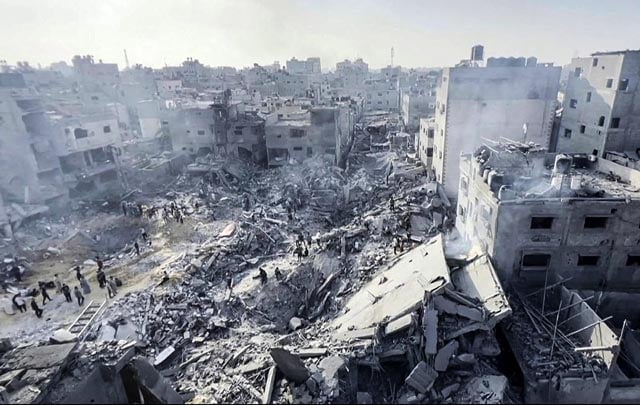The recent escalation of violence in the Gaza Strip has cast a dark shadow over the fragile peace efforts in the region. Following the release of US-Israeli hostage Edan Alexander, hopes for a de-escalation were quickly dashed as Israel intensified its military offensive. Qatar’s Prime Minister, Sheikh Mohammed bin Abdulrahman bin Jassim Al-Thani, expressed deep concern over this development, characterizing Israel’s actions as irresponsible and aggressive, undermining any prospects for peace. His remarks highlight the complexities of the conflict and the daunting challenges in bridging the divide between the warring parties. Qatar’s role as a key mediator, alongside Egypt and the United States, underscores the international community’s efforts to find a resolution to this protracted crisis.
Sheikh Mohammed’s statement at the Qatar Economic Forum emphasized the stark contrast between the expectations arising from Alexander’s release and the subsequent surge in violence. The anticipated “door to end this tragedy” was slammed shut as Israel opted for a more forceful approach, intensifying its operations in Gaza. This dramatic shift in strategy effectively nullified any potential for progress and reinforced the existing deadlock. The Prime Minister’s condemnation of Israel’s behavior reflects the widespread international concern over the escalating humanitarian crisis and the urgent need for a ceasefire.
Qatar’s involvement in mediating the conflict, in collaboration with Egypt and the United States, places the nation at the forefront of diplomatic efforts to find a peaceful resolution. Sheikh Mohammed shed light on the significant obstacles encountered during recent negotiations in Doha, attributing the impasse to a “fundamental gap” between the two sides. He explained that one party, presumably Israel, seeks a partial deal as a stepping stone towards a comprehensive agreement, while the other, presumably Hamas, demands a one-off deal to secure the release of all hostages and end the war. This divergence in objectives has created an insurmountable hurdle, preventing any meaningful progress towards a ceasefire.
The differing approaches to resolving the conflict reflect the deep-seated mistrust and opposing priorities of the involved parties. While Israel seemingly aims for a phased approach, potentially addressing immediate concerns first and paving the way for broader negotiations later, Hamas prioritizes the immediate cessation of hostilities and the return of their captured members. This fundamental difference in strategy has stalled the mediation efforts, leaving the path to peace shrouded in uncertainty. Qatar’s prime minister acknowledged the difficulty in bridging this gap, underscoring the complexity of the negotiations and the need for greater flexibility from both sides.
The situation in Gaza remains precarious as the intensified military operations exacerbate the humanitarian crisis. The mounting civilian casualties and widespread destruction underscore the devastating impact of the conflict on the Palestinian population. The international community’s calls for restraint have gone largely unheeded, highlighting the urgency of finding a sustainable solution. The failure to achieve a breakthrough in negotiations further complicates the situation, leaving the prospect of a prolonged conflict looming large. The comments by Qatar’s prime minister serve as a stark reminder of the challenges in achieving peace in the region.
As the conflict rages on, the need for a renewed diplomatic push becomes increasingly critical. The international community must intensify its efforts to bring the warring parties back to the negotiating table and find common ground. The focus should be on securing a ceasefire, addressing the humanitarian crisis, and ultimately, working towards a lasting solution that addresses the root causes of the conflict. The path to peace remains arduous, but it is a path that must be pursued relentlessly. The alternative is a continuation of the cycle of violence, with devastating consequences for the people of Gaza and the wider region.














